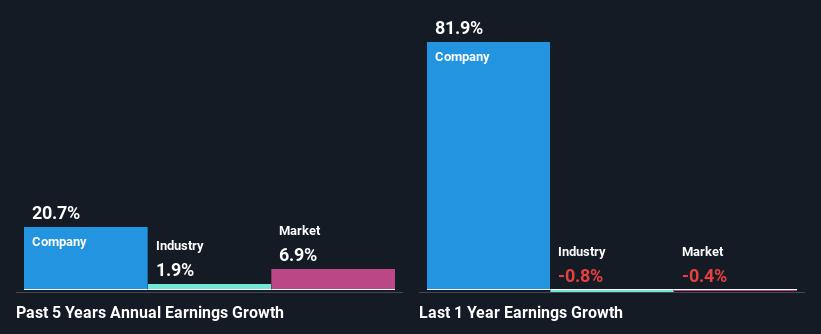Yunnan Energy Investment Co., Ltd.'s (SZSE:002053) Stock On An Uptrend: Could Fundamentals Be Driving The Momentum?
Yunnan Energy Investment's (SZSE:002053) stock is up by a considerable 19% over the past month. As most would know, fundamentals are what usually guide market price movements over the long-term, so we decided to look at the company's key financial indicators today to determine if they have any role to play in the recent price movement. Particularly, we will be paying attention to Yunnan Energy Investment's ROE today.
Return on Equity or ROE is a test of how effectively a company is growing its value and managing investors’ money. Put another way, it reveals the company's success at turning shareholder investments into profits.
View our latest analysis for Yunnan Energy Investment
How To Calculate Return On Equity?
Return on equity can be calculated by using the formula:
Return on Equity = Net Profit (from continuing operations) ÷ Shareholders' Equity
So, based on the above formula, the ROE for Yunnan Energy Investment is:
8.0% = CN¥672m ÷ CN¥8.4b (Based on the trailing twelve months to June 2024).
The 'return' is the profit over the last twelve months. One way to conceptualize this is that for each CN¥1 of shareholders' capital it has, the company made CN¥0.08 in profit.
Why Is ROE Important For Earnings Growth?
Thus far, we have learned that ROE measures how efficiently a company is generating its profits. Depending on how much of these profits the company reinvests or "retains", and how effectively it does so, we are then able to assess a company’s earnings growth potential. Generally speaking, other things being equal, firms with a high return on equity and profit retention, have a higher growth rate than firms that don’t share these attributes.
Yunnan Energy Investment's Earnings Growth And 8.0% ROE
When you first look at it, Yunnan Energy Investment's ROE doesn't look that attractive. However, given that the company's ROE is similar to the average industry ROE of 8.0%, we may spare it some thought. Looking at Yunnan Energy Investment's exceptional 21% five-year net income growth in particular, we are definitely impressed. Taking into consideration that the ROE is not particularly high, we reckon that there could also be other factors at play which could be influencing the company's growth. For example, it is possible that the company's management has made some good strategic decisions, or that the company has a low payout ratio.
We then compared Yunnan Energy Investment's net income growth with the industry and we're pleased to see that the company's growth figure is higher when compared with the industry which has a growth rate of 1.9% in the same 5-year period.

Earnings growth is a huge factor in stock valuation. What investors need to determine next is if the expected earnings growth, or the lack of it, is already built into the share price. This then helps them determine if the stock is placed for a bright or bleak future. Is Yunnan Energy Investment fairly valued compared to other companies? These 3 valuation measures might help you decide.
Is Yunnan Energy Investment Efficiently Re-investing Its Profits?
Yunnan Energy Investment has a really low three-year median payout ratio of 11%, meaning that it has the remaining 89% left over to reinvest into its business. So it looks like Yunnan Energy Investment is reinvesting profits heavily to grow its business, which shows in its earnings growth.
Besides, Yunnan Energy Investment has been paying dividends over a period of nine years. This shows that the company is committed to sharing profits with its shareholders.
Summary
In total, it does look like Yunnan Energy Investment has some positive aspects to its business. With a high rate of reinvestment, albeit at a low ROE, the company has managed to see a considerable growth in its earnings. The latest industry analyst forecasts show that the company is expected to maintain its current growth rate. To know more about the company's future earnings growth forecasts take a look at this free report on analyst forecasts for the company to find out more.
Have feedback on this article? Concerned about the content? Get in touch with us directly. Alternatively, email editorial-team (at) simplywallst.com.
This article by Simply Wall St is general in nature. We provide commentary based on historical data and analyst forecasts only using an unbiased methodology and our articles are not intended to be financial advice. It does not constitute a recommendation to buy or sell any stock, and does not take account of your objectives, or your financial situation. We aim to bring you long-term focused analysis driven by fundamental data. Note that our analysis may not factor in the latest price-sensitive company announcements or qualitative material. Simply Wall St has no position in any stocks mentioned.
 Index Options
Index Options CME Group
CME Group Nasdaq
Nasdaq Cboe
Cboe TradingView
TradingView Wall Street Journal
Wall Street Journal